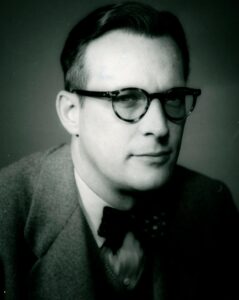Dr. Richard Bardolph (1915-2006)
Born on February 18, 1915 in Chicago, Illinois, United States. Son of Mark and Anna (Veldman) Bardolph.
A prolific scholar, Dr. Bardolph ranged widely over American history. Bachelor of Arts, University Illinois, 1940; Master of Arts, University Illinois, 1941; Doctor of Philosophy, University Illinois, 1944; Doctor of Letters, Concordia College, 1968; Doctor of Laws, Concordia Theological Seminary, 1983.
Trained at Illinois by the renowned agricultural historian, Fred Shannon, he published Agricultural Literature and the Early Illinois Farmer in 1948.
Long before race and civil rights attracted the attention of historians, he did pioneering research on race in American history. His second book, The Negro Vanguard (1959) explored the lives of the first African American professionals from mathematician Benjamin Banneker in the 1790s tennis champion Althea Gibson in 1957-58. The core The Negro Vanguard came from 131 interviews with nationally known professional men and women to whom he responded with compassion and sensitivity.
Richard Bardolph's life as a scholar and teacher was imbued with patriotism, idealism, and religious faith. In 1947, he joined with Greensboro educator, Vance Chavis, in quietly persuading the city's merchants to remove Jim Crow signs from drinking fountains and rest rooms. As a member and renowned adult Sunday School teacher at Ebenezer Lutheran Church and a nationally prominent layman in Lutheran Church-Missouri Synod, he persuaded his denomination to endorse civil disobedience as a Christian witness against racial segregation in 1964, months in advance of the passage of the Civil Rights Act.
Head of the UNCG History Department from 1960-1978, he recruited and proudly nurtured ten historians who attained national recognition. As scholar and citizen, he discovered and declared that the Civil Rights laws of 1964 and 1965 were legal and moral achievements more than a century in the making in his definitive study, The Civil Rights Record, 1849-1970: Black Americans and the Law (1970). In retirement he further reminded North Carolinians that the Tar Heel State was the home to well organized and courageous resistance against the Confederacy in a book-length trio of articles published in the North Carolina Historical Review in 1964 and 1989.
Also in retirement, he supported his wife, Dorothy Bardolph in her historic election to the Greensboro City Council in 1979 and reelections in 1980s. Her legislative achievements in human services, public transportation, ward representation, and billboard regulation were the product of their partnership. Along the way came state and national honors: Ford, Guggenheim, and Woodrow Wilson Fellowships in the 1950s, appointment to the Board of Editors of the Journal of Southern History in 1974, the O. Max Gardner Award "for service to mankind" from the State of North Carolina in 1979, and his University's Alumni Teaching Award in 1980. Dick Bardolph was also an accomplished poet. His verse appeared in the New York Times and the New England Journal of Medicine.

Articles
Book Reviews
No book reviews found for this person.
Images
No images found for this person.
Interviews
No interviews found for this person.
Presentations
Classes
No classes found for this person.
Promotions
No promotions found for this person.
Sermons
No sermons found for this person.
Websites
No websites found for this person.

